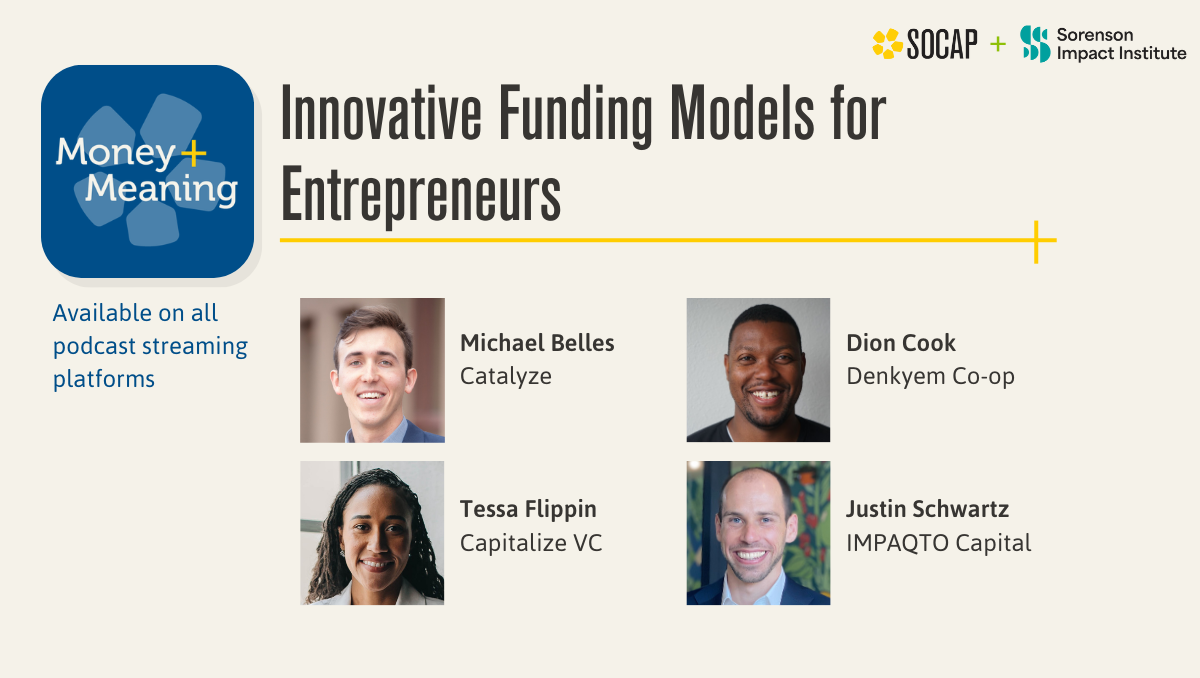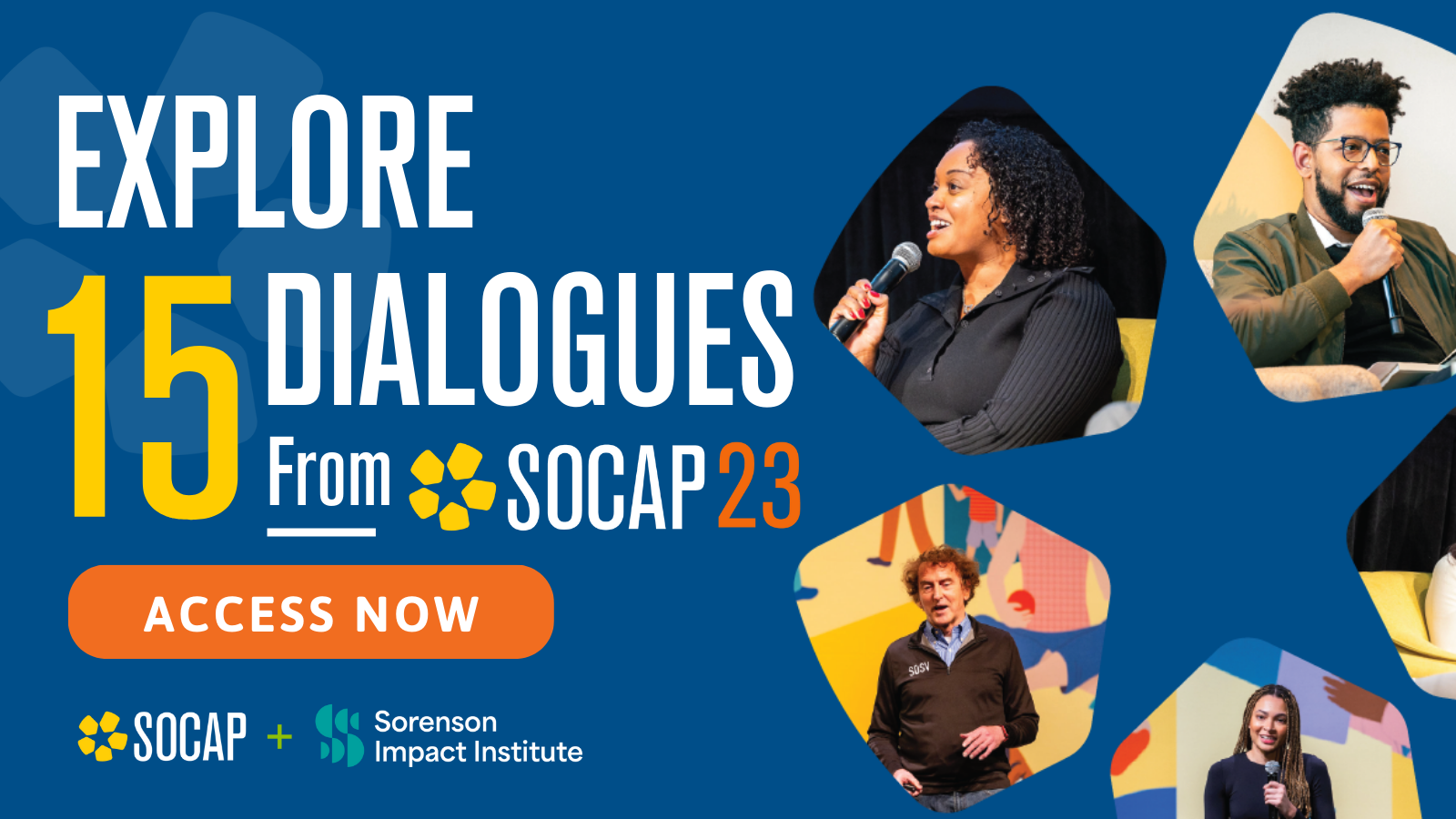A Money + Meaning Podcast with Michael Belles, Dion Cook, Tessa Flippin and Justin Schwartz
Venture capital can serve as funding fuel for some entrepreneurs, but it doesn’t meet the needs of many investors and founders. Innovative capital products can help markets work for more entrepreneurs and fund managers — and they’re gaining traction in the United States and around the world.
A new Money + Meaning podcast episode features a SOCAP23 session exploring innovative funding models that go beyond equity and debt. Three fund managers share their capital solutions designed to better meet the financial needs of many entrepreneurs, especially founders who often are overlooked in traditional funding markets.
Session moderator Michael Belles, Co-Founder and Manager of Catalyze, said these innovative funding methods can be shaped to work for entrepreneurs in varied sectors. “When you step away from this false dichotomy of debt and equity being the only sort of capital products for entrepreneurs, you can see that there’s a broad spectrum of capital that can serve a broad spectrum of entrepreneurs’ capital needs,” he said.
By exploring the market, fund managers are discovering a need for new options in the communities they serve, Belles said. “You have an idea for a solution that doesn’t take the shape of a traditional debt product or traditional equity investment,” he said. “It’s kind of nuanced, it’s unique … and creates shared mutual incentives.”
Denkyem Co-op Founder and CEO Dion Cook said the fund works to create pathways for black entrepreneurs. “We look to invest in and create a thriving black business community to serve as an anchor for economic mobility in the community,” he said. On a systemic scale, Denkyem Co-op aims to dismantle policies that historically excluded people of color and created a racial wealth gap. “My ancestors were excluded from those opportunities and other asset-building opportunities,” he said. “That’s really the root of all of this.”
He said that with a revenue-based financing approach, Denkyem Co-op offers founders a more flexible and growth-friendly capital tool. “This is really a low-cost accessible loan that’s meant to help you grow,” Cook said.
At Capitalize VC, Founder and Managing Partner Tessa Flippin and others use a revenue-based investment vehicle in addition to traditional VC structures. With this different type of investment, Capitalize VC can serve a group of founders in non-technical sectors that otherwise have limited funding options, she said. “A lot of founders step into the fundraising world and think, ‘I need VC,'” Flippin said. “It’s not talked about enough that VC is not the silver bullet for all companies.”
As an example of revenue-based financing, she said Capitalize VC invested $100,000 in a small coffee company with a six-month grace period. Then, the company begins to make payments back to the fund as a percentage of revenue. “This coffee company has then been able to attract other types of capital with the opportunity we gave them to increase their revenue in the short term,” she said. “We were that in-between financing vehicle that allowed them to then get to a point where they were attractive to another larger funder who invested a lot more.”
Justin Schwartz, Co-Founder and Managing Partner of IMPAQTO Capital, and his team use a similar revenue-based financing tool with impact start-ups in the Andean region of South America. In Latin America, most venture capital goes to entrepreneurs in Brazil and Mexico, and many female and Indigenous founders face challenges with funding. The conservative and inflexible banking system presents another barrier.
“Revenue-based loans can fill that gap and work for founders who might not have access to other types of capital,” he said, adding that many entrepreneurs are unfamiliar with it as a funding option. “This requires more effort, time, and passion than VC investing because of the time that you need to spend with entrepreneurs.”
Listen to the full Money + Meaning podcast to learn more about innovative funding approaches and other topics including:
- How fund managers explain the benefits and structure of these innovative funding vehicles to entrepreneurs.
- How they communicate the benefits to investors in a way that resonates and makes financial sense.
- How they quantify the impact and measure the success of these strategies.
Don’t miss out! Subscribe to Money + Meaning on Apple Podcasts, Stitcher, TuneIn, Spotify, or anywhere else you find podcasts.
Listen to more episodes of Money + Meaning here.






